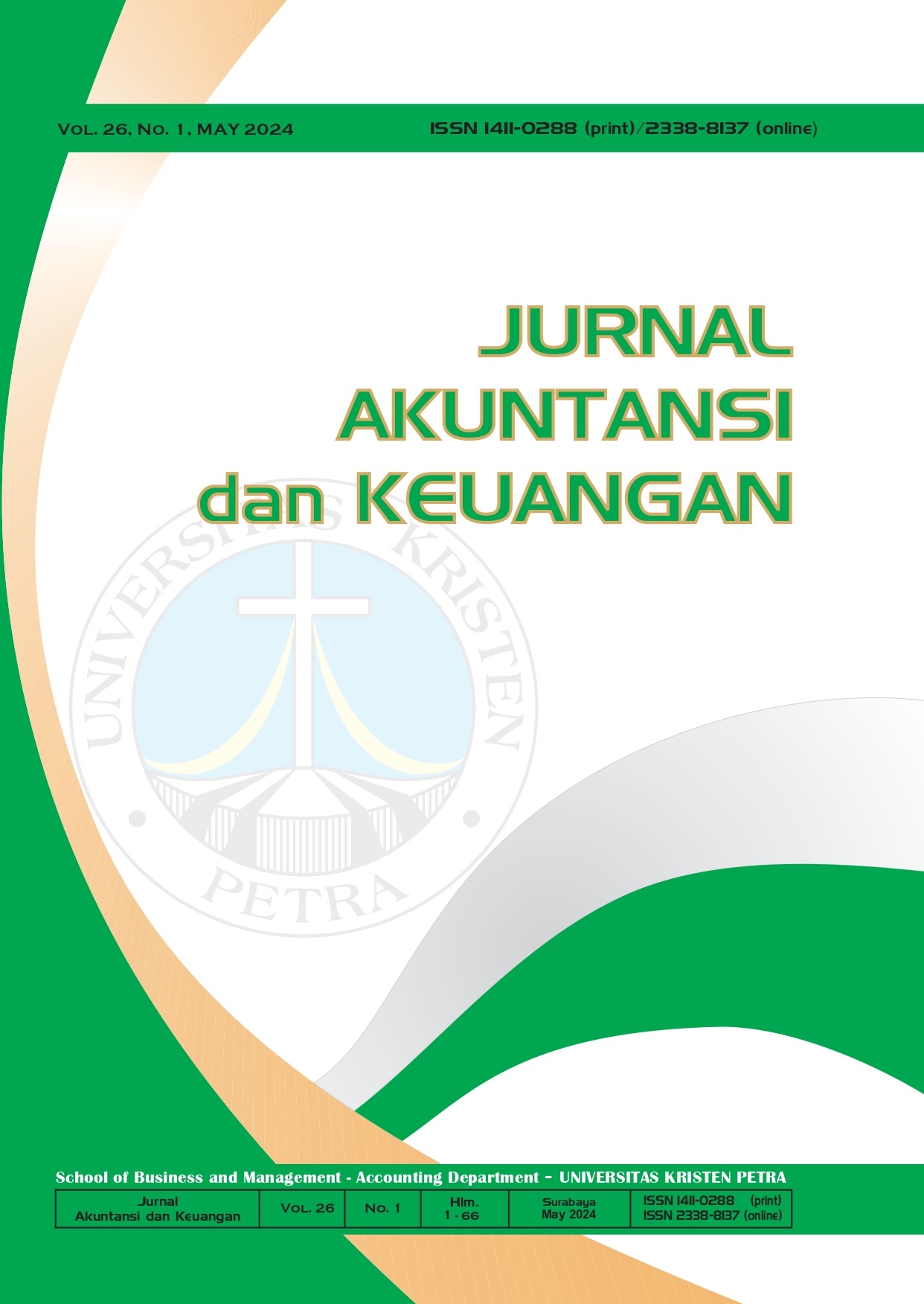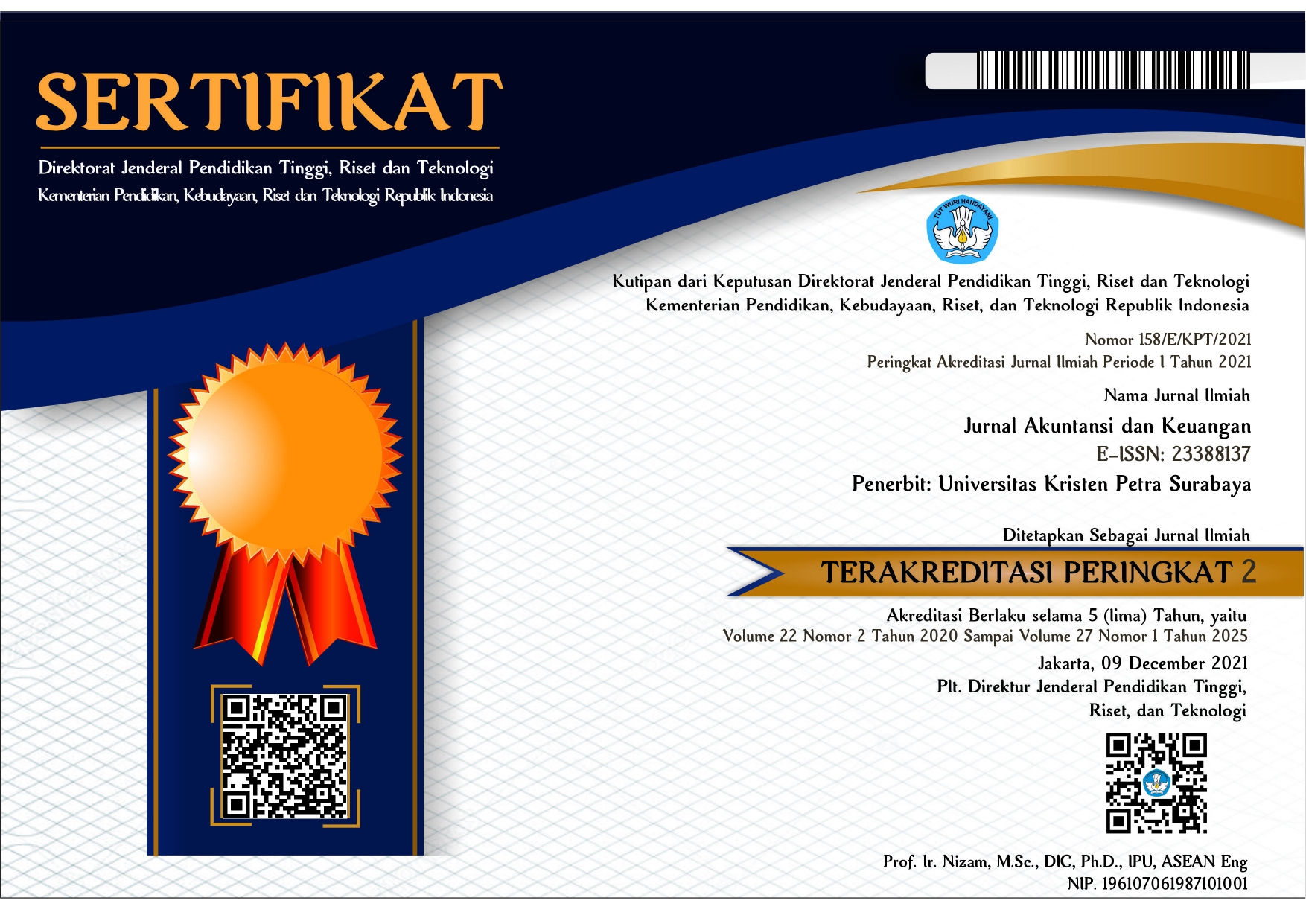Do Board Multiple Directorships and ESG Score Drive Firm Value? Study of Non-Financial Companies in Thailand
DOI:
https://doi.org/10.9744/jak.26.1.67-76Keywords:
Board busyness, ESG, firm value, Tobin’s Q, multiple directorships, board of directorAbstract
This study intends to demonstrate the impact of board busyness through board multiple directorships and ESG scores towards firm value in Thailand within the period of 2018-2022. Theoretical frameworks such as the resource dependence theory and stakeholder theory explicate the two hypotheses developed for busy directors and ESG score. A director has multiple directorships when he/she has more than three board roles in other publicly listed firms, excluding private organizations and foundations. This research’s population are listed non-financial firms in Thailand Stock Exchange that has ESG score in Refinitiv database for five consecutive years during 2018 to 2022. Final data sample are 28 non-financial companies resulting in 140 observations. Directorship and board size were hand collected from annual reports. Panel data regression with random effect model is used, and results show that there is no association between multiple directorship and firm value. On the other hand, ESG shows a positive and significant relationship towards firm value. This research supports the belief that ESG scores have a notable impact on firm value based.
References
Aboud, A., & Diab, A. (2018). The impact of social, environmental, and corporate governance disclosures on firm value. Journal of Accounting in Emerging Economies, 8(4), 442–458. https://doi.org/10.1108/JAEE-08-2017-0079
Adinegara, G., & Sukamulya, S. (2021). The effect of good corporate governance on the market value of financial sector companies in Indonesia. Jurnal Akuntansi dan Keuangan, 23(2), 83–94. https://doi.org/10.9744/jak.23.2.83-94
Ahmad, N., Mobarek, A., & Roni, N. N. (2021). Revisiting the impact of ESG on financial performance of FTSE350 UK firms: Static and dynamic panel data analysis. Cogent Business & Management, 8(1). Article 1900500. https://doi.org/10.1080/23311975.2021.1900500
Alareeni, B. A., & Hamdan, A. (2020). ESG impact on performance of US S&P 500-listed firms. Corporate Governance (Bingley), 20(7), 1409–1428. https://doi.org/10.1108/CG-06-2020-0258
Albuquerque, R., Koskinen, Y., Yang, S., & Zhang, C. (2020). Resiliency of environmental and social stocks: An Analysis of the exogenous COVID-19 market crash. The Review of Corporate Finance Studies, 9(3), 593–621. https://doi.org/10.1093/rcfs/cfaa011
Alhaddad, L., Gerged, A. M., Saidat, Z., Ali Al-Qudah, A., & Aziz, T. (2022). Do multiple directorships stimulate or inhibit firm value? Evidence from an emerging economy. International Journal of Accounting & Information Management, 30(4), 546–562. https://doi.org/10.1108/IJAIM-05-2022-0094
Al-Issa, N., Khaki, A. R., Jreisat, A., Al-Mohamad, S., Fahl, D., & Limani, E. (2022). Impact of environmental, social, governance, and corporate social responsibility factors on firm’s marketing expenses and firm value: A panel study of US companies. Cogent Business & Management, 9(1), 2135214. https://doi.org/10.1080/23311975.2022.2135214
Assenga, M. P., Aly, D., & Hussainey, K. (2018). The impact of board characteristics on the financial performance of Tanzanian firms. Corporate Governance: The International Journal of Business in Society, 18(6), 1089–1106. https://doi.org/10.1108/CG-09-2016-0174
Atan, R., Alam, Md. M., Said, J., & Zamri, M. (2018). The impacts of environmental, social, and governance factors on firm performance. Management of Environmental Quality: An International Journal, 29(2), 182–194. https://doi.org/10.1108/MEQ-03-2017-0033
Aydoğmuş, M., Gülay, G., & Ergun, K. (2022, December). Impact of ESG performance on firm value and profitability. Borsa Istanbul Review, 22, S119–S127. https://doi.org/10.1016/j.bir.2022.11.006
Bakry, A. E. A., Azhar, Z., & Kishan, K. (2023). The effects of amended sustainability reporting requirements on corporate social responsibility reporting and firm value: the moderating role of assurance. Journal of Financial Reporting and Accounting. Advance online publication. https://doi.org/10.1108/JFRA-11-2022-0414
Bazrafshan, A., & Hesarzadeh, R. (2022). Board busyness and firm productivity. Personnel Review, 51(3), 1138 – 1168. https://doi.org/10.1108/PR-07-2019-0375
Boivie, S., Withers, M. C., Graffin, S. D., & Corley, K. G. (2021). Corporate directors’ implicit theories of the roles and duties of boards. Strategic Management Journal, 42(9), 1662–1695. https://doi.org/10.1002/smj.3320
Buachoom, W. (2018). How do board structures of thai firms influence on different quantile levels of firm performance? Advances in Pacific Basin Business, Economics and Finance, 6, 157–189. https://doi.org/10.1108/s2514-465020180000006004
Chee, K. D., & Tham, Y. H. (2021). The role of directors with multiple board seats and earning quality: A Singapore context. Journal of Corporate Accounting & Finance, 32(1), 31–47. https://doi.org/https://doi.org/10.1002/jcaf.22474
Chen, K. D., & Guay, W. R. (2020). Busy directors and shareholder satisfaction. Journal of Financial and Quantitative Analysis, 55(7), 2181–2210. https://doi.org/10.1017/S0022109019000590
Cheng, R., Kim, H., & Ryu, D. (2023). ESG performance and firm value in the Chinese market. Investment Analysts Journal, 53(1), 1–15. https://doi.org/10.1080/10293523.2023.2218124
Ciftci, I., Tatoglu, E., Wood, G., Demirbag, M., & Zaim, S. (2019). Corporate governance and firm performance in emerging markets: Evidence from Turkey. International Business Review, 28(1), 90 – 103. https://doi.org/10.1016/j.ibusrev.2018.08.004
Daniliuc, S., Li, L., & Wee, M. (2021, April). Busy directors and firm performance: a repli¬cation and extension of Hauser (2018). Accounting & Finance, 61, 1415–1423. https://doi.org/10.1111/acfi.12631
Díaz, V., Ibrushi, D., & Zhao, J. (2021). Reconsidering systematic factors during the Covid-19 pandemic – The rising importance of ESG. Finance Research Letters, 38, Article 101870. https://doi.org/10.1016/j.frl.2020.101870
Ferris, S. P., Jayaraman, N., & Liao, M.-Y. (2020). Better directors or distracted directors? An international analysis of busy boards. 44, Article 100437. https://doi.org/10.1016/j.gfj.2018.05.006
Freeman, E., Harrison, J. S., Wicks, A. C., Parmar, B. L., & de Colle, S. (2010). Stakeholder Theory: The State of the Art. Cambridge University Press.
Gray, S., & Nowland, J. (2018). Director workloads, attendance and firm performance. Accounting Research Journal, 31(2), 214–231. https://doi.org/10.1108/ARJ-02-2016-0023
Hatane, S. E., Winoto, J., Tarigan, J., & Jie, F. (2023). Working capital management and board diversity towards firm performances in Indonesia’s LQ45. Journal of Accounting in Emerging Economies, 13(2), 276–299. https://doi.org/10.1108/JAEE-11-2018-0130
Juniarti, J., Beoang, C. F., Prayogo, M. F. S., & Samosir, P. A. (2021). Business strategy and environmental performance. Jurnal Akuntansi dan Keuangan, 23(2), 95–104. https://doi.org/10.9744/jak.23.2.95-104
Kim, K. (2022, November). When are busy boards beneficial? The Quarterly Review of Economics and Finance, 86, 437–454. https://doi.org/10.1016/j.qref.2022.08.008
Latif, B., Voordeckers, W., & Lambrechts, F. (2024). Overcommitted to show up in the board? The moderating effect of ownership. Review of Managerial Science, 18(1), 131–160. https://doi.org/10.1007/s11846-022-00616-7
Le, Q., Vafaei, A., Ahmed, K., & Kutubi, S. (2022, April). Independent directors’ reputation incentives and firm performance – an Australian perspective. Pacific-Basin Finance Journal, 72, Article 101709. https://doi.org/10.1016/j.pacfin.2022.101709
Lee, K.-W., & Lok, C.-L. (2020). Busy boards, firm performance and operating risk. Asian Academy of Management Journal of Accounting and Finance, 16(2), 1–21. https://doi.org/10.21315/aamjaf2020.16.2.1
Li, Y., Gong, M., Zhang, X.-Y., & Koh, L. (2018). The impact of environmental, social, and governance disclosure on firm value: The role of CEO power. The British Accounting Review, 50(1), 60–75. https://doi.org/10.1016/j.bar.2017.09.007
Lu, J., & Khan, S. (2023). Are sustainable firms more profitable during COVID-19? Recent global evidence of firms in developed and emerging economies. Asian Review of Accounting, 31(1), 57–85. https://doi.org/10.1108/ARA-04-2022-0102
Maji, S. G., & Lohia, P. (2023). Environmental, social and governance (ESG) performance and firm performance in India. Society and Business Review, 18(1), 175–194. https://doi.org/10.1108/SBR-06-2022-0162
Makridou, G., Doumpos, M., & Lemonakis, C. (2023). Relationship between ESG and corporate financial performance in the energy sector: empirical evidence from European companies. International Journal of Energy Sector Management, 18(4), 873-895. https://doi.org/10.1108/IJESM-01-2023-0012
Manna, A., Sahu, T. N., & Pandey, K. D. (2020). Board size, multiple directorship performance of India listed firms. International Journal of Economics and Business Research, 19(2), 111-129. https://doi.org/10.1504/IJEBR.2020.104754
Mans-Kemp, N., Viviers, S., & Weir, J. (2020). Investigating the extent and impact of director overboardedness using a comprehensive measure. Corporate Governance: The International Journal of Business in Society, 20(5), 821–836. https://doi.org/10.1108/CG-07-2019-0234
Melinda, A., & Wardhani, R. (2020). The effect of environmental, social, governance, and controversies on firms’ value: Evidence from Asia. In Advanced Issues in the Economics of Emerging Markets (International Symposia in Economic Theory and Econometrics), 27, 47–173. https://doi.org/10.1108/S1571-038620200000027011
Menicucci, E., & Paolucci, G. (2023). ESG dimensions and bank performance: an empirical investigation in Italy. Corporate Governance: The International Journal of Business in Society, 23(3), 563–586. https://doi.org/10.1108/CG-03-2022-0094
Mishra, A. K., Jain, S., & Manogna, R. L. (2021). Does corporate governance charac¬teristics influence firm performance in India? Empirical evidence using dynamic panel data analysis. International Journal of Disclosure and Governance, 18(1), 71–82. https://doi.org/10.1057/s41310-020-00098-7
Mohammad, W. M. W., & Wasiuzzaman, S. (2021). Environmental, social and governance (esg) disclosure, competitive advantage and performance of firms in Malaysia. Cleaner Environmental Systems, 2, Article 100015. https://doi.org/10.1016/j.cesys.2021.100015
Pan, F. (2021, May 13). ESG Disclosure and Performance in Southeast Asia. Sustainalytics. Retrieved May 10, 2024, from https://www. sustainalytics.com/esg-research/resource/investors-esg-blog/esg-disclosure-and-performance-in-southeast-asia
Pfeffer, J., & Salancik, G. (2015). External control of organizations—Resource dependence perspective. In J. B., Miner (Eds.). Organizational Behavior 2, 373–388. Routledge.
Refinitiv. (2023, December). Environmental, social and governance scores from LSEG. Retrieved May 10, 2024, from https://www.lseg.com/content/dam/data-analytics/en_us/documents/methodology/lseg-esg-scores-methodology.pdf?elqCampaignId=13827
Reguera-Alvarado, N., & Bravo, F. (2017). The effect of independent directors’ characteristics on firm performance: Tenure and multiple directorships. Research in International Business and Finance, 41, 590–599. https://doi.org/10.1016/j.ribaf.2017.04.045
Saleh, M. W. A., Shurafa, R., Shukeri, S. N., Nour, A. I., & Maigosh, Z. S. (2020). The effect of board multiple directorships and CEO characteristics on firm performance: evidence from Palestine. Journal of Accounting in Emerging Economies, 10(4), 637–654. https://doi.org/10.1108/JAEE-12-2019-0231
Samy El-Deeb, M., Ismail, T. H., & El Banna, A. A. (2023). Does audit quality moderate the impact of environmental, social and governance disclosure on firm value? Further evidence from Egypt. Journal of Humanities and Applied Social Sciences, 5(4), 293–322. https://doi.org/10.1108/JHASS-11-2022-0155
Tan, K. M., Bany-Ariffin, A. N., Kamarudin, F., & Abdul Rahim, N. (2019). Does directors’ experience positively moderate the impact of board busyness on firm efficiency? Evidence from Asia-Pacific. Asia-Pacific Journal of Business Administration, 11(3), 232–250. https://doi.org/10.1108/APJBA-01-2019-0008
Thailand Securities and Exchange Commission. Corporate Governance Code for listed companies 2017., (2017). Retrieved April 10, 2024, from https://www.ecgi.global/sites/default/files/codes/documents/Thai%20cgcode%20EN.pdf
Tham, Y. H., Sultana, N., Singh, H., & Taplin, R. (2019). Busy boards and earnings management – an Australian perspective. Asian Review of Accounting, 27(3), 464–486. https://doi.org/10.1108/ARA-08-2018-0149
Trinugroho, I., Risfandy, T., Hanafi, M. M., & Sukmana, R. (2023). Busy commissioners and firm performance: Evidence from Indonesia. International Journal of Emerging Markets, 18(11), 5028–5048. https://doi.org/10.1108/IJOEM-01-2020-0007
Uhlaner, L., Massis, A. de, Jorissen, A., & Du, Y. (2021). Are outside directors on the small and medium-sized enterprise board always beneficial? Disclosure of firm-specific information in board-management relations as the missing mechanism. Human Relations, 74(11), 1781–1819. https://doi.org/10.1177/0018726720932985
Viviers, S., & Mans-Kemp, N. (2019). Director overboardedness in South Africa: evaluating the experience and busyness hypotheses. International Journal of Disclosure and Governance, 16(1), 68–81. https://doi.org/10.1057/s41310-019-00057-x
Wong, W. C., Batten, J. A., Ahmad, A. H., Mohamed-Arshad, S. B., Nordin, S., & Adzis, A. A. (2021, Maret). Does ESG certification add firm value? Finance Research Letters, 39, Article 101593. https://doi.org/10.1016/j.frl.2020.101593
Yu, E. P., Guo, C. Q., & Luu, B. Van. (2018). Environmental, social and governance transparency and firm value. Business Strategy and the Environment, 27(7), 987–1004. https://doi.org/10.1002/bse.2047
Downloads
Published
How to Cite
Issue
Section
License
Authors who publish with this journal agree to the following terms:
- Authors retain the copyright and publishing right, and grant the journal right of first publication with the work simultaneously licensed under a Creative Commons Attribution License that allows others to share the work with an acknowledgement of the work's authorship and initial publication in this journal.
- Authors are able to enter into separate, additional contractual arrangements for the non-exclusive distribution of the journal's published version of the work (e.g., post it to an institutional repository or publish it in a book), with an acknowledgement of its initial publication in this journal.
- Authors are permitted and encouraged to post their work online (e.g., in institutional repositories or on their website) followingthe publication of the article, as it can lead to productive exchanges, as well as earlier and greater citation of published work (See The Effect of Open Access).<a href="http://creativecommons.org/lice















